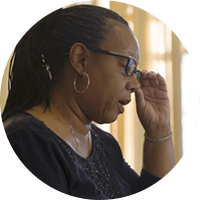My sons, Lawrence and Lamont, were identical twins. They were inseparable. In elementary school, one would rush to the other’s classroom and wait until he was dismissed.
Living in the same house in Washington, D.C. that I, and my mother before me, had grown up in, they attended Howard University together. Both worked part-time to help pay their tuition and they graduated together in May 1998.
But a month before their graduation, the police came to the door one night and arrested Lawrence and Lamont. They were charged with conspiracy as part of a 20-person powder and crack cocaine operation, implicated by the owner of a Maryland auto body shop.
My boys never missed a day in school, they never stayed out all night – and then one night the police knocked on the door and said they were drug dealers.
In court, they maintained their innocence and would not accept a plea bargain. Although no drugs, paraphernalia or drug money were found in their house or on their person, they were separately convicted of conspiracy to distribute powder and crack cocaine on the testimony of members of the conspiracy, and records showing calls they made to the body shop.
According to Lawrence and Lamont, the phone calls related to a botched repair job on their uncle’s car. The owner of the body shop had his sentence reduced by implicating others to 36 months. Although neither of my boys had a prior conviction, they were sent to separate prisons hundreds of miles apart. Lamont was sentenced to a mandatory minimum sentence of 19 years and Lawrence to 15 years.
After they were found guilty in June they never came back home. I didn’t think stuff like this happens. If I had other children, how could I tell them “Stay in school, be good and nothing bad will happen to you”? Because I now know that’s not true.
I’ve become an advocate for drug policy reform and sentencing law reform. I know that I cannot go back and change the fate of my only twin sons, but I want to help other sons and daughters who might become victims of these unjust laws – laws which often punish racial minorities the most
I hope I can be halfway effective in helping. Because right now, things don’t seem to be getting any better.
